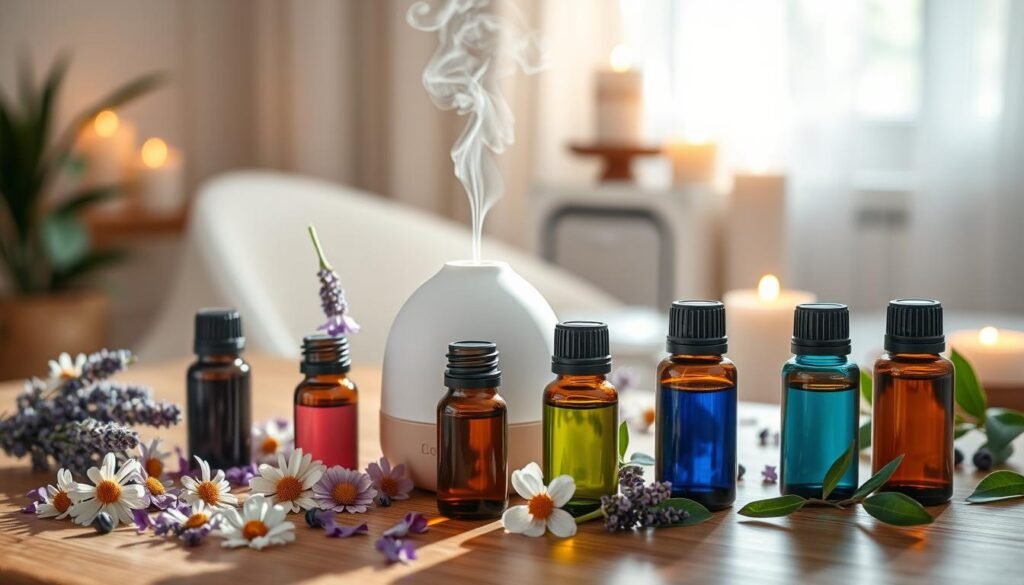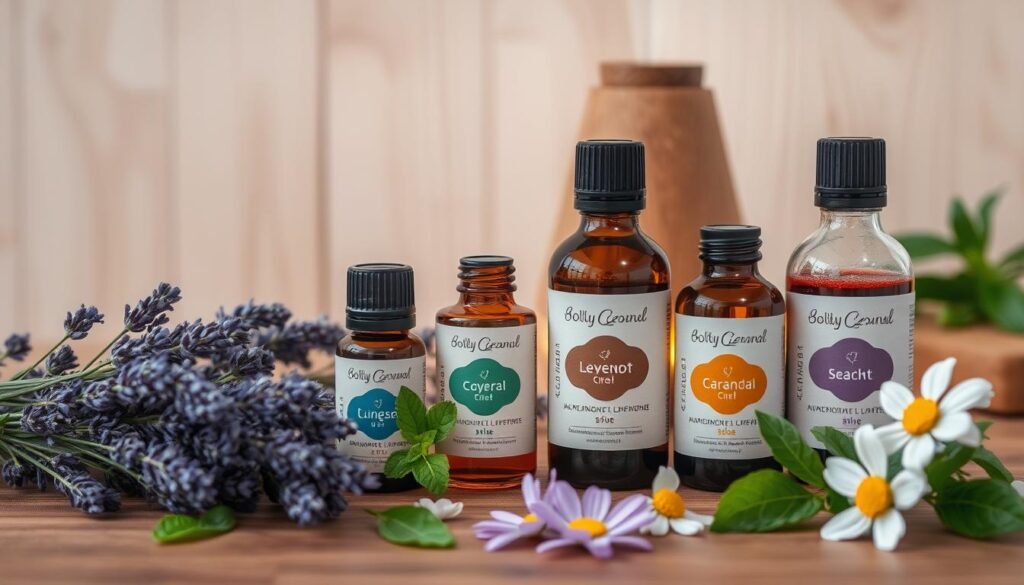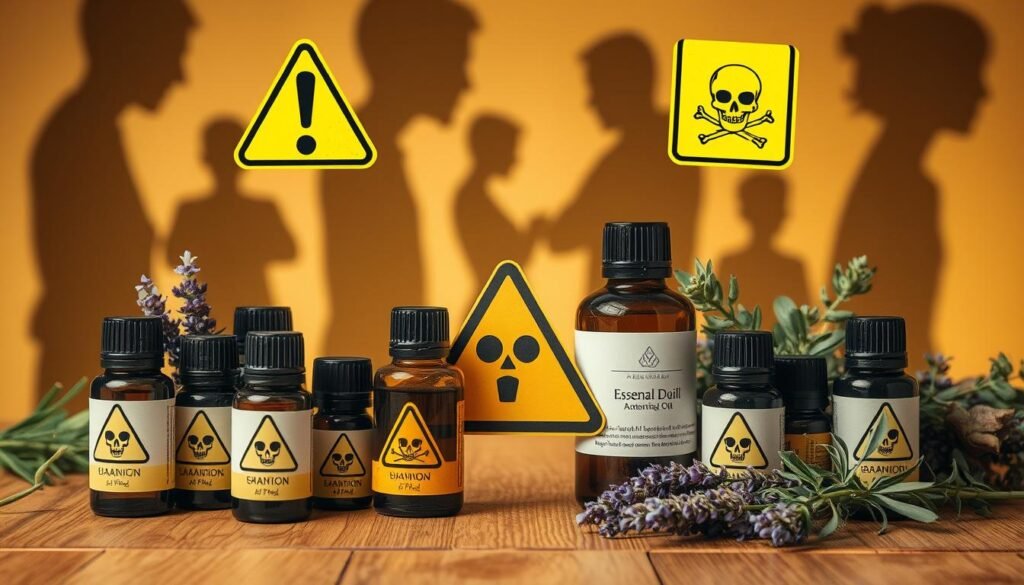Over 40 million adults in the United States deal with anxiety disorders. Sadly, only a few get the help they need. Because of this, it’s vital to look into natural ways to ease anxiety. Aromatherapy stands out as a soothing option.
It uses essential oils to calm the mind. Imagine the relief lavender or the energy from bergamot can provide. Aromatherapy for anxiety lets people find peace and embrace mental health.
Key Takeaways
- Aromatherapy offers a natural approach to managing anxiety symptoms.
- Essential oils like bergamot and chamomile have shown effectiveness in research.
- Calming scents can significantly improve mental wellness and reduce stress.
- Understanding the properties of each oil is essential for optimal use.
- Consulting a healthcare provider ensures safety when using these natural remedies.
Understanding Anxiety and Its Impact
Anxiety is a common mental health issue. It shows up as too much worry, fear, and being unable to relax. It affects people in different ways. Understanding its effects is key to finding the right way to manage it.
Common Symptoms of Anxiety
It’s important to know the signs of anxiety for early help. Some symptoms are:
- Difficulty sleeping: People with anxiety often can’t relax, which messes up their sleep.
- Irritability: They might have mood swings and get upset easily.
- Muscle tension: Anxiety can also cause your muscles to feel tight.
- Avoidance of social situations: Anxiety might make someone not want to hang out with others.
How Anxiety Affects Daily Life
Anxiety can really change how people live. It can make work harder and hurt friendships and family life. People might face these issues:
| Aspect of Life | Effects of Anxiety |
|---|---|
| Work Performance | Less focus, more putting things off, and not doing as well at work. |
| Personal Relationships | There might be more arguments and pulling away from others. |
| General Well-being | Anxiety can make someone’s overall happiness take a hit. |
Knowing about these symptoms and how anxiety changes lives helps in seeking the right help. Options like aromatherapy can be a good way to manage anxiety.
The Benefits of Aromatherapy
Aromatherapy uses essential oils from plants for mental wellness. It’s known for boosting emotional balance, especially in those with anxiety. Studies show it can help with relaxation and reduce stress symptoms.
Holistic Approach to Mental Wellness
Essential oils like lavender, chamomile, and clary sage are key in aromatherapy. They are used to calm anxiety, improve sleep, and boost well-being. Studies have found that comforting scents lower stress, anxiety, and depression.
This makes aromatherapy a great alternative for mental health. It offers a whole-person approach that many find beneficial.
Research Supporting Aromatherapy’s Effectiveness
Many studies confirm aromatherapy’s role in reducing anxiety. For example, lavender oil has been seen to ease stress and help with sleep in intensive care patients. Research also shows it can improve sleep by reducing anxiety, pain, and fatigue.
This evidence suggests aromatherapy could be an effective treatment for anxiety. It’s particularly helpful in easing the stress of medical procedures. However, it’s important to be cautious if you’re pregnant or on certain medications. Essential oils offer a promising support alongside traditional treatments.
For more detailed information on the current research, visit Mount Sinai’s health library.
How Aromatherapy Works on the Brain
Aromatherapy has a strong impact on our feelings by interacting with the brain. It uses essential oils to stimulate olfactory receptors. These send signals to the limbic system in the brain. Understanding this connection helps us see how scents can make us feel relaxed or happy. This is key in using aromas to help with anxiety.
The Connection Between Scents and Emotional Response
Research shows that essential oils can change our mood. Lavender oil is often used for its calming effects, being featured in about 30.71% of studies. Studies by Burnett et al. (2004) and Ebrahimi et al. (2021) have shown it can lower anxiety. Citrus oils like bergamot and sweet orange also boost happiness, appearing in 24.4% of studies.
The Role of the Limbic System in Anxiety Management
The limbic system helps control our feelings of anxiety. It regulates stress hormones and how we respond emotionally. Aromatherapy can thus help create a peaceful mind, offering a natural way to fight anxiety. Inhalation is the top method used in about 58.57% of studies.
Lavender, lemon, and bergamot oils have been noted for their soothing impacts. They show how using scents can aid in managing anxiety. For more details on their benefits, check out this resource.
Essential Oils for Stress Relief
Essential oils are a natural way to beat stress and anxiety. They’ve been researched for how they help relax and boost well-being. Knowing which oils work best for stress and ensuring they are high quality is key.
Popular Essential Oils and Their Properties
Some essential oils are famous for their strong calming effects. Here’s a quick look at the top choices:
| Essential Oil | Benefits | Notes |
|---|---|---|
| Lavender | Promotes relaxation and better sleep | Commonly used in aromatherapy |
| Bergamot | Alleviates anxiety and improves mood | Effective within 15 minutes of inhalation |
| Chamomile | Grounding and calming effects | Ideal for meditation |
| Sweet Orange | Helps reduce symptoms of depression | Often uplifting and energizing |
| Ylang Ylang | Reduces anxiety and promotes positive feelings | Effective in animal studies, showing promise for humans |
| Frankincense | Calms the nervous system | Recommended for restorative sleep |
How to Choose Quality Essential Oils
It’s important to pick high-quality essential oils for the best results. Look for therapeutic-grade oils from trusted sources. Things to remember include:
- Check for GC/MS reports to verify purity.
- Avoid oils with synthetic additives.
- Select oils made from natural ingredients.
- Consider brands specializing in essential oils for stress relief.

Essential oils are quite affordable, with prices usually between $7.99 and $20.99. This makes exploring different oils easy. Aromatherapy is now more accessible, helping everyone find stress relief.
Exploring Natural Remedies for Anxiety
Many people look for different ways to lower their anxiety and improve how they feel. There’s a growing interest in natural ways to ease anxiety. Aromatherapy with essential oils can be very helpful. When you add it to other methods like mindfulness, yoga, and cognitive-behavioral therapy, the benefits can be even greater.
Combining Other Therapeutic Techniques
Using a mix of methods can make natural anxiety treatments more effective. Mindfulness techniques can lower anxiety symptoms as much as typical medicine. Yoga helps with relaxation and physical health, and cognitive-behavioral therapy builds coping strategies. Research shows the advantages of methods like:
- Mindfulness meditation
- Exercise and physical activity
- Healthy sleep habits
- Stress management techniques
Importance of Professional Consultation
It’s crucial to get advice from a professional when looking at natural anxiety cures. Health experts can offer tailored advice based on your health history and symptoms. They will check if herbal supplements and your current medicine work well together. This step helps make sure you choose your treatments wisely, especially because the products vary in quality and might have side effects. For further details on using natural supplements for anxiety, see natural supplements for anxiety relief.
Aromatherapy for Anxiety: Best Essential Oils
Many essential oils help in reducing anxiety and boosting emotional health. They bring unique benefits to the table. These essential oils are top picks for easing anxiety, helping to bring relaxation and peace.
Lavender for Relaxation
Lavender is known for its ability to calm the mind. Studies have found it lowers anxiety in patients before surgery. Its pleasant smell encourages relaxation without making you sleepy, which is great for stress relief.
Chamomile for Soothing Effects
Chamomile is famous for its soothing impact, which aids in managing anxiety. It can improve sleep and ease nerves. This makes it a natural choice for those facing anxiety, with a comforting scent to boot.
Bergamot for a Mood Boost
Bergamot oil is great at reducing pre-surgery anxiety, research shows. Its refreshing fragrance lifts spirits and fights off bad moods, providing a helpful boost when times are tough.
Ylang-Ylang for Peace
Ylang-ylang brings peace and calm, helping to lower stress. It can also boost self-esteem. Many appreciate its floral scent for easing anxiety moments.
Clary Sage for Tension
Clary sage oil eases tension and helps with relaxation, especially during the menstrual cycle. It makes calming down easier, assisting in daily anxiety management.
Frankincense for Grounding
Frankincense offers grounding effects, aiding in emotional balance. It calms, supports the immune system, and helps with circulation. It’s a great choice for those wanting to feel better and lessen anxiety.

How to Use Essential Oils for Anxiety
Using essential oils can help reduce anxiety significantly. It’s key to know how to use them the right way to get the most out of their benefits. You can either diffuse them for a calming environment or apply them topically for direct relief.
Diffusing: Creating a Calm Environment
By diffusing essential oils, you turn any room into a peaceful oasis. Lavender, chamomile, and bergamot oils are great in a diffuser. They help ease tension, encourage relaxation, and improve your mood. Try diffusing these oils for 15-30 minutes to fill the air with calming scents. Plus, placing a few drops on a cotton ball near your bed can help you unwind at night. Studies show that these scents can lower stress-related hormone levels and boost well-being.
Topical Applications and Safety Tips
Applying essential oils directly offers focused relief. Ylang-ylang and frankincense oils are especially calming. Remember to mix them with carrier oils, like jojoba or almond oil, to avoid skin irritation. Always do a patch test before regular use. Massages with these diluted oils can bring peace and are perfect for self-care. Adding essential oils to a bath with Epsom salt or baking soda also increases relaxation.
To make the most of essential oils for anxiety and stay safe, use them properly. There’s a research article that goes into the effectiveness of various essential oils for mental health. It offers valuable insights into how these oils can help.
Blending Essential Oils for a Customized Experience
Blending essential oils is a special way to boost their effects, creating unique scents and benefits. There are many ways to mix them so their smells and effects work well together. Certain blends are great for easing anxiety, helping with relaxation and emotional steadiness.
Techniques for Blending Oils
Here are some tips for mixing essential oils:
- Ratio Exploration: Try different ratios to see what you like best.
- Layering Scents: Begin with a base note, add middle notes, and top it off with top notes. This makes a full scent.
- Concentration Control: Change the drop amount to get the strength you want. This keeps it safe and effective.
- Trial and Error: Write down what works so you can do it again later.
Recommended Blends for Anxiety Relief
There are special mixes designed to lessen anxiety symptoms:
- Lavender, Frankincense & Bergamot: A calming blend perfect for keeping emotions stable.
- Rose Geranium, Clary Sage & Sweet Orange: This mix is good for relaxation and lowering stress.
- Peppermint, Lemon & Ylang-Ylang: It’s refreshing and energizing, great for a mood boost.
- Jasmine, Chamomile & Sweet Orange: A soft mix that soothes your mind and lowers anxiety.
These mixes show how blending oils can meet anxiety relief needs. Each one uses the oils’ special properties. This lets people find the best match for mental health.
Incorporating Aromatherapy into Your Daily Routine
Using essential oils every day can bring peace and calm. It turns regular tasks into mindful moments, improving well-being. Morning or evening, diffusing oils or enjoying an aromatic bath can slash stress.
Creating an Aromatherapy Ritual
Simple steps can embed essential oils into everyday life. A popular approach is diffusing lavender or chamomile to relax at home. Other ideas include:
- Morning meditations with energizing smells to kickstart the day.
- Evening baths with essential oils to calm body and mind.
- Sniffing soothing scents when stressed to find your peace.
These habits can shape a rewarding aromatherapy routine, fostering emotional health.
Using Aromatherapy in Stressful Situations
Aromatherapy is a strong ally against stress. Breathing in oils like peppermint or bergamot before big events helps with relaxation. Keep a rollerball with oil for instant stress relief. This can keep you calm in tough times. For tips on adding essential oils to your life, see more at incorporating essential oils into your routine.
Risks and Considerations When Using Essential Oils
Essential oils can help with anxiety relief, but they also have challenges. Knowing the risks is key for anyone trying aromatherapy for the first time. There can be side effects, which shows why using them wisely is important.
Potential Side Effects and Allergies
Some people don’t think about possible side effects or allergies from essential oils. You might see:
- Skin irritation or sensitivity
- Gastrointestinal upset
- Respiratory issues, such as trouble breathing
Even if some oils calm you down, ones like cinnamon or oregano need to be diluted. For safe use on the skin, keep dilution under 5%. Before using oil for the first time, do a patch test and check your skin after 24 hours.
Consultation with Healthcare Providers
It’s important to talk to a healthcare provider before adding essential oils to your health routine. This is especially true for those with ongoing health issues. Some oils might not mix well with regular medicines and could cause problems. Women who are pregnant or nursing should avoid certain oils, like camphor and wormwood.
Also, some oils can impact hormonal conditions, affecting things like asthma or epilepsy. By being informed, users can safely enjoy aromatherapy while keeping risks low.
| Essential Oil | Common Side Effects | Precautions |
|---|---|---|
| Cinnamon | Skin irritation | Always dilute before use |
| Lavender | Allergic reactions | Consult before use during pregnancy |
| Sweet Orange | None commonly reported | Safe for most; consult if allergic |
| Pennyroyal | Highly toxic if ingested | Avoid during pregnancy |

Conclusion
Aromatherapy is a natural way to ease anxiety. It uses essential oils to help you relax and find balance. Studies, including ones with cancer patients and college students, show it works. For example, lavender oil significantly reduces anxiety.
Aromatherapy comes in different forms like massages or quick sessions. Adding it to your daily life can help lower anxiety. But, it’s important to do your research and talk to experts before starting.
As people look for natural ways to deal with anxiety, aromatherapy is becoming more popular. Essential oils can help bring calm and balance to your life. This might help improve your overall well-being.